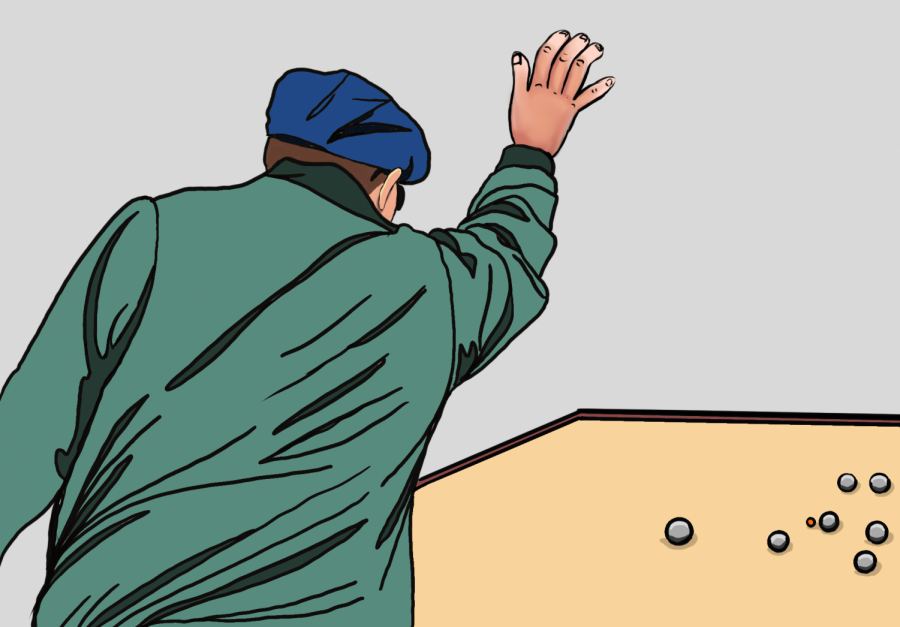
 An ignorant bystander might consider a soccer goalie just a lazy field-player. He hangs out in the goal box while the other players sprint furiously around the field. He can use his hands. In some games, he might not even touch the ball.
An ignorant bystander might consider a soccer goalie just a lazy field-player. He hangs out in the goal box while the other players sprint furiously around the field. He can use his hands. In some games, he might not even touch the ball.
In fact, the job of goalie is every bit as challenging as the job of a field player.
“People think it’s such a simple position,” said senior Brett Axelrod, goalkeeper for the men’s soccer team at Whitman. On the contrary, the unique nature of the position makes it especially complex.
When asked what he likes most and least about playing goalie, Axelrod responded, “pressure.” The role of goalie offers “no room for mistakes,” he said. As the last line of defense, the goalie is the final barrier between the ball and the goal. Mike Washington, the coach of the men’s soccer team, agreed.
“It’s a lot easier for field players to hide mistakes than it is for goalies,” he said.
Goalkeepers’ mistakes are obvious and easy to spot: a scored goal.
“If another player makes a mistake, there generally isn’t as drastic of a consequence,” noted first-year Lauren Brougham, one of two back-up keepers for the women’s soccer team at Whitman.
All three goalies interviewed mentioned the importance of good concentration during a game. Sophomore Tim Shu, the backup keeper for the men’s soccer team, discussed the challenge of staying focused.
“Goalies need to maintain an amazingly high level of concentration for the entire 90 minutes,” he explained. “It’s quite mentally exhausting. You can never let your guard down.”
Another mental aspect of the job involves anticipating what might happen next.
“A goalkeeper needs to think two to three steps ahead in the negative to make sure that everything is setup,” noted Scott Shields, the coach of the women’s soccer team.
The keeper needs to make sure that his teammates are playing effectively and evaluate the other team’s offensive strengths. Most importantly, he needs to link these two parts together in order to craft an effective defensive plan.
Once he’s determined how to best prevent a goal, he needs to communicate the strategy with his teammates and make sure it’s put in place. All this must occur instantaneously and without hesitation.
“It’s a lot about confidence,” said Brougham. “If you’re holding back, if you’re hesitant, it doesn’t work.”
Good communication is essential between goalies and their teammates. The goalie’s physical position on the field gives him a great view of the game: he notices things that other players can’t detect. This advantage of perspective allows him to direct the rest of the team accordingly. Shields revealed Courtney Porter, the goalkeeper for the women’s soccer team, to illustrate the leadership role of the goalie.
“If Courtney tells you to do something, you listen,” declared Shields. “She needs to have the final say because she’s the one that deals with the final result: the shot on goal.”
A goalie’s job is never done. Once he makes a save, he doesn’t pause the game to revel in his victory. After making a save, “I have to get right back into it,” said Axelrod. “I don’t have time to celebrate.” He needs to remain focused and return to his job of protecting the goal. Offensive players, on the other hand, have the entire jog back to the midfield line to delight in their goal.
Although the goalie is the last line of defense, he is not the only line of defense. The entire team: even the forwards: plays defensively at certain moments in the game. Consequently, a goalie’s statistics can be misleading: the number of saves made during a game or the number of shutouts in a season don’t always represent a goalie’s skill-level. A shutout game can be attributed to the whole team, not just to the goalie.
“I get bailed out plenty of times by my defense,” remarked Axelrod.
The position of goalie is complex, difficult and multi-faceted. Goalies don’t get the opportunity to chase down a defender or score a goal. Instead, they act as a quiet force within the game, observing and directing their teammates even as the ball launches into the opposing team’s goal. As Shields put it, “goalkeepers are very special individuals.”











Myspace Proxies • Jan 18, 2009 at 12:46 pm
Excellent articles and great blog, i shared it with my Digg friends on New York , Stumble UP ! , Cheers Andy Colleman – Chicago
john black • Jan 8, 2009 at 5:45 am
Generally Ido not post on blogs, but I would like to say that this post really forced me to do so! really nice post.
dave nava • Jan 6, 2009 at 1:49 am
I just love your weblog. Very nice post. Actually you can do many thing to imporve it.